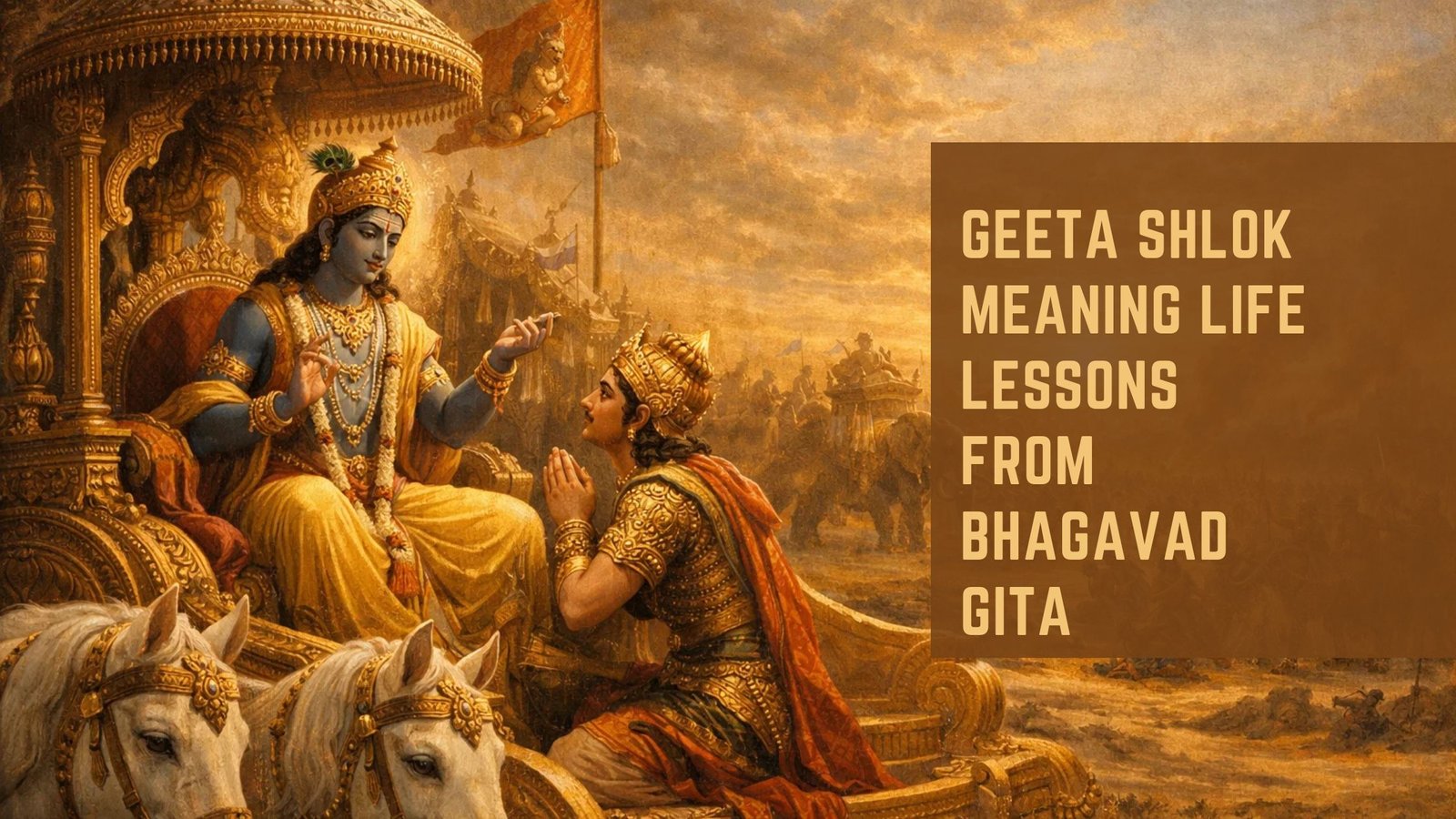The Bhagavad Gita, a revered text in Hindu philosophy, serves as a spiritual guide that addresses the complexities of life and the pursuit of righteousness.
In this verse, Arjuna, the warrior prince, poses a pivotal question to Lord Krishna regarding the paths of devotion and knowledge.
He seeks clarity on which path is superior for attaining spiritual realization. Krishna’s response not only elucidates the essence of devotion but also highlights its significance in the broader context of spiritual practice. This dialogue encapsulates the eternal struggle between the intellectual pursuit of knowledge and the heartfelt surrender to divine love.
The teachings of this verse resonate deeply with seekers of truth, offering insights into the nature of devotion and its transformative power. As Arjuna grapples with his duties and moral dilemmas on the battlefield, he represents every individual facing life’s challenges. The Gita’s exploration of devotion provides a framework for understanding how one can navigate these complexities through a sincere and dedicated relationship with the divine.
This introduction sets the stage for a deeper exploration of devotion as articulated in the Bhagavad Gita, revealing its multifaceted dimensions and its role in spiritual evolution.
Key Takeaways
- Bhagavad Gita 12:2 emphasizes the importance of devotion as a path to spiritual enlightenment.
- Devotion in the Bhagavad Gita is understood as unwavering love and dedication to the divine.
- A devotee in the Bhagavad Gita is characterized by qualities such as humility, patience, and compassion.
- Devotion is important in the Bhagavad Gita as it leads to a deeper connection with the divine and inner peace.
- Cultivating devotion in practice involves acts of selfless service, prayer, and meditation.
Understanding Devotion in the Bhagavad Gita
Devotion, or bhakti, is a central theme in the Bhagavad Gita, representing a path that transcends mere ritualistic practices or intellectual understanding. It embodies a deep emotional connection to the divine, characterized by love, surrender, and unwavering faith. In the context of the Gita, devotion is not just an expression of worship; it is a profound relationship that fosters intimacy with God.
This relationship is marked by an acknowledgment of one’s limitations and a recognition of the divine’s omnipotence. Through devotion, individuals cultivate a sense of belonging to something greater than themselves, which can be both comforting and empowering. Krishna’s teachings emphasize that devotion is accessible to all, regardless of one’s background or intellectual capacity.
Unlike the path of knowledge, which may require extensive study and contemplation, devotion invites individuals to engage with their emotions and experiences. It encourages them to express their love for God through various forms of worship, prayer, and service. This inclusivity makes devotion a practical approach for those seeking spiritual fulfillment amidst life’s chaos.
The Gita illustrates that through sincere devotion, one can attain liberation and union with the divine, making it a vital aspect of spiritual practice.
The Qualities of a Devotee

In the Bhagavad Gita, Krishna outlines several qualities that define a true devotee. These attributes serve as guiding principles for individuals aspiring to deepen their relationship with the divine. Among these qualities are humility, compassion, self-control, and unwavering faith.
A devotee embodies humility by recognizing their limitations and surrendering their ego to God. This humility fosters an openness to divine guidance and an acceptance of life’s circumstances as part of a greater plan. Compassion is another essential quality that Krishna highlights.
A true devotee extends love and kindness not only to fellow beings but also to all living creatures. This compassion reflects an understanding of the interconnectedness of life and reinforces the idea that serving others is akin to serving God. Self-control is equally important; it allows devotees to transcend their desires and attachments, focusing instead on their spiritual goals.
Finally, unwavering faith acts as the bedrock of devotion, providing strength during challenging times and reinforcing the belief that God is always present and supportive. To learn more about the Bhagavad Gita and its teachings on devotion, you can visit the Holy Bhagavad Gita website.
The Importance of Devotion in the Bhagavad Gita
| Aspect | Importance |
|---|---|
| Definition of Devotion | Describes the selfless dedication and love towards a higher power or deity. |
| Role in Bhagavad Gita | Emphasizes the importance of devotion as a path to spiritual growth and liberation. |
| Types of Devotion | Describes different forms of devotion such as Bhakti Yoga, Karma Yoga, and Jnana Yoga. |
| Benefits of Devotion | Brings inner peace, contentment, and a sense of connection with the divine. |
| Devotion in Action | Illustrates how devotion can be practiced through selfless service and surrender to the divine will. |
The importance of devotion in the Bhagavad Gita cannot be overstated. It serves as a bridge between the individual soul and the Supreme Being, facilitating a direct connection that transcends intellectual barriers. Devotion fosters a sense of purpose and direction in life, guiding individuals toward righteous actions aligned with their spiritual aspirations.
Krishna emphasizes that through devotion, one can attain peace and fulfillment that eludes those who rely solely on knowledge or material pursuits. Moreover, devotion acts as a transformative force that purifies the heart and mind. It encourages individuals to let go of negative emotions such as anger, jealousy, and pride, replacing them with love and gratitude.
This transformation is essential for spiritual growth, as it allows devotees to experience a deeper sense of joy and contentment. The Gita teaches that true happiness arises not from external achievements but from an inner connection with the divine. Thus, devotion becomes a vital component in the quest for self-realization and ultimate liberation.
How to Cultivate Devotion in Practice
Cultivating devotion requires intentional practice and dedication. The Bhagavad Gita offers various methods for nurturing this essential quality in daily life. One effective approach is through regular prayer and meditation.
These practices create a sacred space for individuals to connect with God, express their thoughts and feelings, and seek guidance. By dedicating time each day to these spiritual practices, devotees can deepen their relationship with the divine and cultivate a sense of inner peace. Another way to foster devotion is through selfless service or seva.
Engaging in acts of kindness and service not only benefits others but also reinforces one’s commitment to spiritual growth. By serving those in need, devotees embody the qualities of compassion and humility that are central to bhakti. Additionally, reading sacred texts like the Bhagavad Gita can inspire individuals on their devotional journey.
Reflecting on these teachings allows devotees to internalize spiritual principles and apply them in their lives.
Overcoming Obstacles on the Path to Devotion

While the path of devotion is rewarding, it is not without its challenges. Many individuals encounter obstacles that can hinder their progress toward cultivating a deeper relationship with the divine. One common challenge is doubt or skepticism about one’s faith or spiritual practices.
Such doubts can lead to feelings of disconnection or frustration. However, Krishna’s teachings encourage devotees to confront these doubts with patience and perseverance. Engaging in open dialogue with fellow seekers or spiritual mentors can provide clarity and reassurance during these times.
Another significant obstacle is attachment to worldly desires and distractions. In today’s fast-paced world, it is easy for individuals to become consumed by material pursuits or societal expectations. The Gita teaches that recognizing these distractions is crucial for overcoming them.
By practicing mindfulness and focusing on one’s spiritual goals, devotees can gradually detach from superficial concerns and redirect their energy toward nurturing their devotion. Embracing simplicity in lifestyle choices can also help create an environment conducive to spiritual growth.
The Fruits of Devotion
The fruits of devotion are manifold and profoundly transformative.
One significant fruit is inner peace—a state of tranquility that arises from surrendering one’s worries and anxieties to God.
This peace allows devotees to navigate life’s challenges with grace and resilience, fostering a sense of stability amidst uncertainty. Additionally, devotion nurtures love and compassion within individuals, leading them to develop deeper connections with others. As they embody these qualities, devotees often find themselves more empathetic and understanding toward those around them.
This shift not only enhances personal relationships but also contributes to a more harmonious community. Ultimately, the fruits of devotion culminate in self-realization—the profound understanding that one is part of a greater whole and intimately connected to the divine source.
Embracing Devotion in Life
In conclusion, embracing devotion as articulated in the Bhagavad Gita offers individuals a pathway toward spiritual fulfillment and inner peace. The teachings surrounding bhakti illuminate its significance as a means of connecting with the divine while navigating life’s complexities. By understanding the qualities of a devotee and recognizing the importance of devotion in spiritual practice, individuals can cultivate this essential aspect in their lives.
As seekers embark on this journey, they may encounter obstacles along the way; however, perseverance and dedication will ultimately lead them toward profound transformation. The fruits of devotion—inner peace, love, compassion—serve as guiding lights on this path, enriching not only individual lives but also fostering harmony within communities. By embracing devotion wholeheartedly, individuals can experience a deeper connection with themselves and the universe around them, paving the way for a more meaningful existence rooted in love and spirituality.
In a related article to Bhagavad Gita Chapter 12 Verse 2, the power of faith is explored in depth. This article delves into the importance of having unwavering faith in the divine and how it can guide us through life’s challenges. Just as Chapter 12 Verse 2 emphasizes the need for devotion and surrender to the Supreme Being, this article highlights the transformative power of faith in overcoming obstacles and finding inner strength. It serves as a reminder of the timeless wisdom found in the Bhagavad Gita and its relevance in navigating the complexities of life.
FAQs
What is the Bhagavad Gita?
The Bhagavad Gita is a 700-verse Hindu scripture that is part of the Indian epic Mahabharata. It is a sacred text of the Hindu religion and is considered one of the most important spiritual classics.
What is Chapter 12, Verse 2 of the Bhagavad Gita?
Chapter 12, Verse 2 of the Bhagavad Gita is a specific verse within the scripture that is part of a larger discourse between the prince Arjuna and the god Krishna. It is a verse that holds significance in the context of the teachings and philosophy presented in the Bhagavad Gita.
What is the significance of Chapter 12, Verse 2 of the Bhagavad Gita?
The significance of Chapter 12, Verse 2 lies in its message and teachings about devotion and the path to spiritual liberation. It is a verse that addresses the qualities and attitudes of a devotee and their relationship with the divine.
How is Chapter 12, Verse 2 of the Bhagavad Gita interpreted?
Interpretations of Chapter 12, Verse 2 of the Bhagavad Gita may vary among different scholars, spiritual leaders, and practitioners of Hinduism. It is often studied and analyzed in the context of the broader themes and philosophy presented in the scripture.














